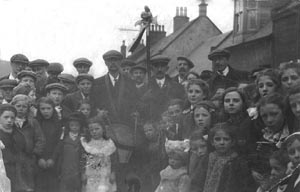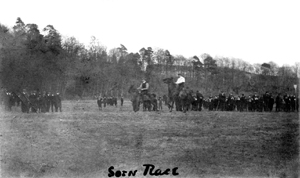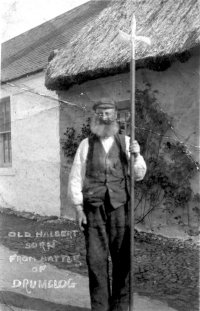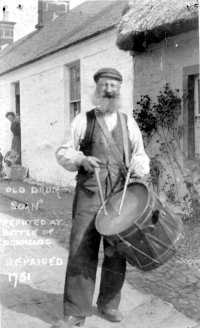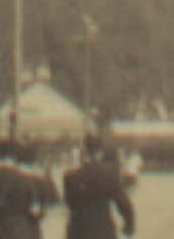Sorn Races
Photo
Sanny Wyper Photo
Terry Harrison
Left: A gathering outside the Sorn Inn, at the
Sorn Races. Tam Kerr is holding the drum. The pub building is the gable at the
head of the chap holding the halbert. To the right of him is Billy Jameson,
with the bunnet sideways, who lived at the house in Sandbed nearest Coalford,
(Now the Post Office), and next to "Granny Harrison". The girl on
the right with the white patch on her left shoulder is Mrs Murdoch, John Murdoch
the plumber's mother.
Click here for a newspaper cutting dated around 1925??
|
Left: Photo Billy Gibson and
Margaret Scott
Right: Photo Billy Frew
Click
here to listen to the sound
of the old drum, played at Sorn Race days, and other special events. Click
above the drum to open a higher res image of Blackie. The image above shows
Andrew "Blackie" Reid, who was the great grandfather of Margaret
Scott, and according to legend, beat the drum at the Sorn races for 60 years.
See the references to him below in the book "Sorn Parish: Its History
and Associations" by Helen J. Steven, 1898. Reference is also
made to Cork Reid, his father. Note the spelling of Blackie on the
reverse of the old photo, but he is referred to as Blackey in the book.
Halbert is sometimes spelt as halberd.
The writing on this old images are as follows.
Old
halbert Sorn
From Battle
Of Drumclog |
Old
drum Sorn
Reputed at Drumclog
Repaired 1751 |
The curling club was formed
by Mr Farquar-Gray of Gilmilnscroft in 1795 , at the Greenfoot Inn, opposite
the new cemetery. The
Covenantor's Flag, old drum and halbert, presently kept at Sorn Castle for safe
keeping, were presented to the Sorn Curling Club by Farquhar-Gray of Gilmilnscroft,
in 1798. See page 22 of record book 1, for the original documentation.
The story goes, that in 1679, after hearing of the Dragoons at Drumclog, the
then Mr Farquhar-Gray left Gilmilnscroft, beating the drum, and collecting followers
all the way to Drumclog. The dragoons were defeated at The Battle of Drumclog,
and Farquhar-Gray returned to Sorn with the drum and Halbert.
(Story - Chris Lees, related to him by the late Jimmy Gibson of Woodlea, Sorn)
Yet the club records clearly state the set of colours as the flag was known
as, and the drum were made in 1689!

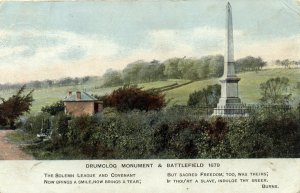
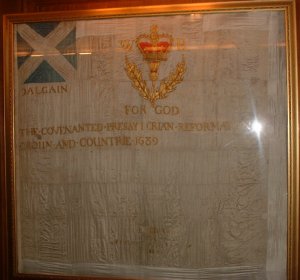 Photo Archie Templeton, Low Drumclog Photo
- ayrshirehistory.com
Photo Archie Templeton, Low Drumclog Photo
- ayrshirehistory.com
The site of the battle of Drumclog, as it was before 1905
Right: The flag which hangs on the wall in Sorn Castle
The drum and halbert were brought out for the Sorn
Races in years gone by.
The most recent time the halbert and drum have been used, was as part of the
commemorative display for the 150th anniversary of Sorn primary School, in September
2001 at a display in the village hall.
An article appeared in the
book "Sorn Parish: Its History and Associations" by Helen J. Steven,
1898, printed by Dunlop and Drennan, Kilmarnock, about the Sorn Races. An excellent
poem is also included.
Sorn Races
A hundred and fifty years ago an annual race was instituted at the village
of Sorn, and although the function has lost in importance, it is continued to
this day. Long ago, on its occurrence in the month of March, traders came from
far and wide, and buying and selling went on to a considerable extent. It was
looked upon as a sort of fair in the district and was the only annual re-union
of the farmers of the parish. Now it is almost, or quite, a farce. For the last
few years the chief competitor in the race has been the pigman with his horse
from Kilmarnock. After bringing the pigs, the horse is taken from the cart and
sometimes gives a good account of itself on the course. This function is called
the "big race." On the following day the "wee race " takes
place, in which the children of the village and neighbourhood take part. There
is always great interest manifested in the "wee race," and a collection
is made in the villages for prizes. An ancient drum, said to have been used
at Drumclog, but about which some people are a trifle skeptical, is in the hands
of the Race Committee. It was played for sixty years at the two races by Blackey
Reid, the last of the weavers. The following is a characteristic description
of Sorn Race, written by Mr. Wm. Aitken, formerly of Catrine, now Inspector
on the railway, Greenock :-
The first Sorn Race I e'er was at, I still can min' it weel,
It cheers my heart, the thocht o't yet, and mak's me younger feel
And weel the clachan callans kent that this day was in store
No ae broon bawbee had we spent for many a day before.
And time seemed sweart tae slip away- no ane o' us was richt
We couldna eat oor meat by day, nor tak' oor sleep at nicht;
We smiled, and sae did aulder fools, and wore a cheery face,
Instead o' gangin to the schules, we'd all gang to the Race.
And when the schule-clock hauns drew near the magic 'our 0' twa
Oot cam the ancient Halberdier, the Committee and a';
"Wee Jamie" lookin' lairge as life, wi' swallow-tail and lum,
"Co " threshin' at it wi' the fife, and "Blackey" wi'
the drum
And foremost 'mong the ither folk who followed up the hill,
Was " Moleman Miles" and "Hedger Jock," and hamely "Butcher
Will,"
And burly "Farmer Rab" sae big, and mony a weel-kenn't face,
A' makin' for the "Timmer Brig" tae see the famous Race.
The horses were a'body's talk-some five were entered in,
The first o' which could scarcely walk, the next yin couldna rin
The third was no like yin wad fag, but then 'twas nearly blin'
The fourth yin was a sorry nag-a bag o' banes an' skin
The fifth, though like a racin' beast, rode by a pigman chiel,
Wad no dae ought but jump and re'ist, and caper through the fiel';
A mair unlikely lookin' set could hardly shown their face,
Yet oot the five 'twas thocht we'd get a fairish kind 0' Race.
When tae the scratch at length they cam', nae time ava was lost-
To start them "Blackey" beat the drum, while "Jamie"
stood the post-
And sic a race ye ne'er did see, though yin and a' did feats,
For out the five auld horses, we had hauf-a-dizzen heats;
Sic riders, tae, they wadna need tae been the least thing frail-
Some tumbled owre the horse's heid, and some fell owre the tail;
Ae horse dang owre a sweetie stan' erected near the place;
'Twas liker eatin' beans and bran than rinnin' at a Race.
Back tae the town we a' came down as sune's the race was by,
When, though the nicht was queer and wat, some folks were queer and dry;
And siccan horrid stuffs they selt's for drink that afternin,
'Twad gur'd a vera grunstane melt, and burn'd a hole in whin
Yet some sae quick their cash did spen'-while rows got unca rife-
That thrippence wad that nicht ere ten ha'e almost saved a life;
And even when next day was come it didna men' the case;
It took till that day week wi' some, tae finish up the Race.
"Sorn Parish: Its History
and Associations" 
Click here to view the text of the whole book. Click the back button to return
to this page.
Reference was made to the Sorn Races in the statistical
account by John Strawhorn, and William Boyd, 1951.
"It is rather regrettable that one old-time event, the annual Sorn Race,
has been allowed to lapse within the lifetime of the older people. The races were
run by the children in the village street; they were begun to the sound of a drum
and the turning-point was marked by a man bearing a halberd. There was also a
horse race held in a nearby field in which a motley company of country steeds
took part. The meal associated with this particular event was one of 'veal and
oatmeal'. The drum and halberd used, according to local tradition, were relics
of the battle of Drumclog. With a flag associated with the same battle they are
now in safe custody in Sorn Castle."
More recent times perhaps?
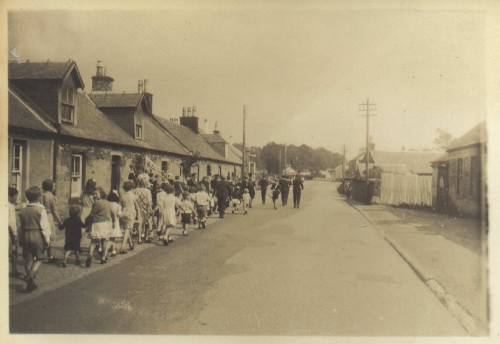
Photo Jim Nisbet
The procession, walking up the main street, looks as though some are carrying
Union Jacks (British Flags) There are at least 2 sets of bagpipes in the lead,
as well as the halbert, see below. Just past the phone pole on the left is the
old Co-op / store building, which today is the Old Folks Cabin.
The halbert can be seen clearly,
by the leading man, Woodlea is the house gable showing.
The drum was brought out during
other events, eg the 1937 coronation 
Back to Sorn Home Page  Back to Other Items Page
Back to Other Items Page 
